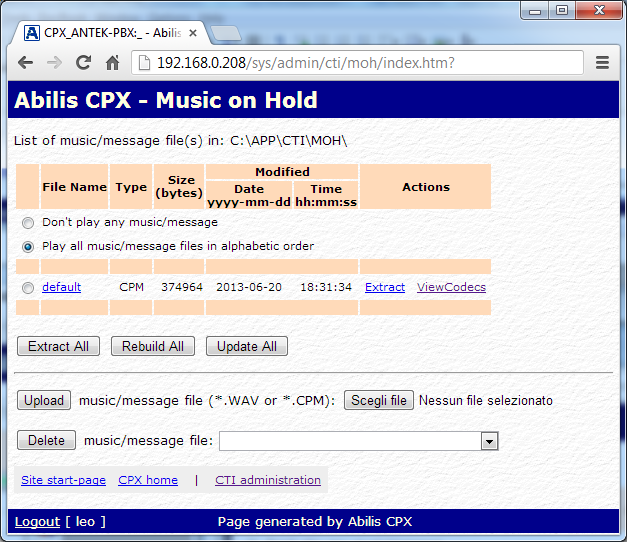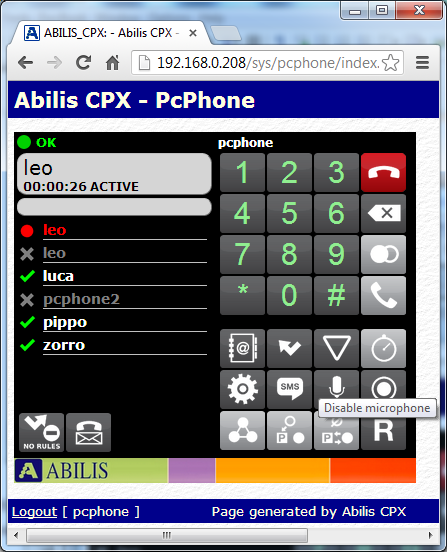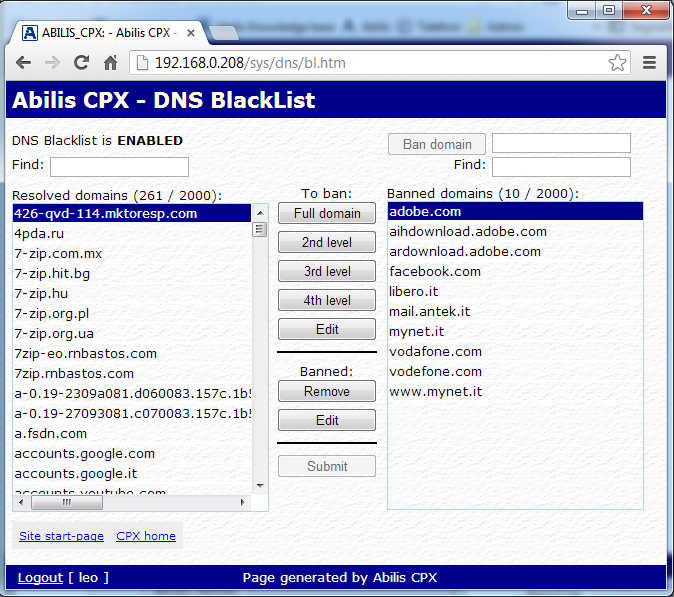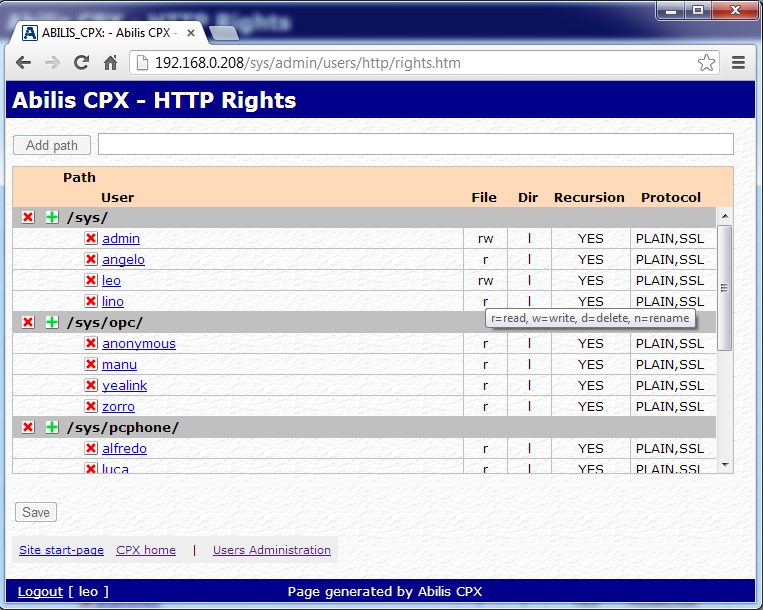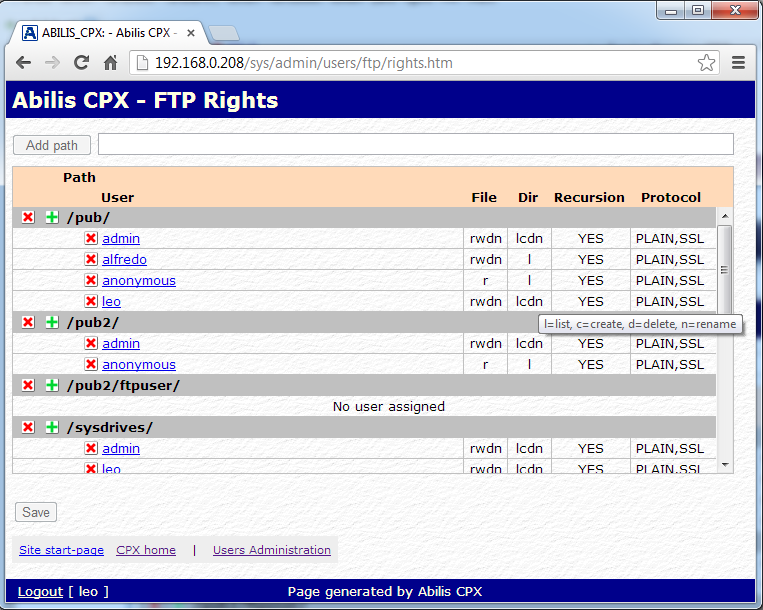Abilis CPX 2000, update 7.7.2
Released on July 30, 2013.
Enhancements
- Hardware
-
-
Added support for the new PB22-LP card, a "low profile card".
This low profile card offers 2 NT/TE PRI ports and 2 NT/TE BRI ports with an internal switch to enable/disable the 100 ohms terminators.
It offers 1 DSP for a total of 4 channels and up to 60 HDLC for B channels, which are also usable for up to 60 SWAC channels.
-
Added support for the new BRI4-LP card, a "low profile card".
This low profile card offers 4 NT/TE BRI ports with an internal switch to enable/disable the 100 ohms terminators.
It offers 2 DSPs for a total of 8 channels and 8 HDLC for B channels, which are also usable for up to 8 SWAC channels.
-
- System
-
-
Improved D SMBIOS output.
It is now possible to view all or individuals TYPES BLOCKS.
Actual presence of block types depends on BIOS M/B implementation. It's usual that not all blocks are present.
[13:45:23] ABILIS_CPX:d smbios ? D SMBIOS Display System Management BIOS information of the most relevant SMBIOS block types D SMBIOS ALL Display System Management BIOS information of all supported block types D SMBIOS TYPE:nnn[,mmm,...] Display System Management BIOS information of the specified block type(s) TYPE: List of block type values [1..255] or "A" or "ALL". See HELP SMBIOS for the list of supported SMBIOS block types. [13:58:10] ABILIS_CPX:d smbios type: ? D SMBIOS TYPE:nnn[,mmm,...] Display System Management BIOS information of the specified block type(s) TYPE: List of block type values [1..255] or "A" or "ALL". ----+---------------------------------------- Type|Name ----+---------------------------------------- 0|BIOS Info 1|System Info 2|Baseboard Info 3|System enclosure 4|Processor Info 5|Memory controller Info 6|Memory module Info 7|Cache Info 8|Port Connector Info 9|System slots 10|On Board Devices Info 11|OEM Strings 12|System Configuration Options 13|BIOS Language Info 14|Group Associations 15|System Event Log 16|Physical memory array 17|Memory device 18|32-bit Memory Error Info 19|Memory Array Mapped Address 20|Memory Device Mapped Address 21|Built-in Pointing Device 22|Portable Battery 23|System Reset 24|Hardware security 25|System Power Controls 26|Voltage probe 27|Cooling device 28|Temperature probe 29|Electrical Current probe 30|Out-of-Band Remote Access 31|Boot Integrity Services Entry Point 32|System Boot Info 33|64-bit Memory Error Info 34|Management Device 35|Management Device Component 36|Management Device Threshold Data 37|Memory Channel 38|IPMI Device Info 39|System Power Supply 40|Additional Info 41|Onboard Devices Extended Info 42|Management Controller Host Interface ----+---------------------------------------- [13:58:19] ABILIS_CPX:
-
- Cti system
-
-
Added support for software transcoding between G.711, Spirit and G.729A codecs.
Software transcoding does not use DSP or SWAC, it uses the host CPU(s), like SWAC, but does not require a licence.
Software trancoding does not require de-jittering because it converts packets in the host CPU, without passing through the TDM interface, as it is required by AC and SWAC (HW transcoding).
For single core machines it works on the main CPU, for the multicore machines it works on the extra CPUs.
Use of SW transcoding vs HW transcoding (AC and SWAC) is regulated via TRANSCODING: parameter in the Audio compressors defaults section of ctisys parameters. The default value is SW-FIRST.
[12:45:14] ABILIS_CPX:d p ctisys audio RES:CtiSys -------------------------------------------------------------------- Run DESCR:CTI_System_general_properties - Audio compressors defaults ------------------------------------------- ... HIPASS-FLT:YES POST-FLT:YES TRANSCODING:SW-FIRST [12:45:27] ABILIS_CPX: [12:45:27] ABILIS_CPX:d p ctisys audio ? ... TRANSCODING: Choose transcoding performed by CPU (SW) or by audio compressors (AC) [SW-FIRST, AC-FIRST, SW-ONLY, AC-ONLY] [12:46:31] ABILIS_CPX:A software transcoding uses 2 MCD (Multi Coder Decoder) elements. The maximal number of MCD elements is shown in ctisys diagnostics, and depends on CPU speed and number of cores.
[12:47:17] ABILIS_CPX:d d ctisys ... ------------------------------------------------------------------------ - SWAC and MCD limits by CPU ------------------------------------------- MAX-SWAC-0ms:13 MAX-SWAC-8ms:11 MAX-SWAC-16ms:10 MAX-SWAC-32ms:8 MAX-MCD-SPIRIT:13 MAX-MCD-G729A:13 - SWAC and MCD diagnostics --------------------------------------------- CUR-SWAC:0 PEAK-SWAC:3 REST-SWAC:8 MAX-SWAC:8 LIMIT-SWAC:CPU CUR-MCD:0 PEAK-MCD:3 ------------------------------------------------------------------------ ... [12:48:41] ABILIS_CPX:
-
- Opc
-
-
Sip user with SIP-TYPE:PHONE can now use OPC dashboard for Click&Call, CallTry, Transfer, Conference, and of course the calls Drag&Drop and the call forwards.
The services are intentionally limited to SIP-TYPE:PHONE because such services would not work correctly with other SIP-TYPEs.
Since an Abilis user may be associated to four different interfaces, CTIP, CLUS, SIP, IAX, the OPC preferences now give the possibility to specify which is the desired interface for which to log-in, this is called own interface. All OPC commands will target the own interface.
Since the preferences are stored on Abilis and are "per user", it is not possible to log in from different clients with different interfaces.
See below some screenshots.
Figure: Own interface selection
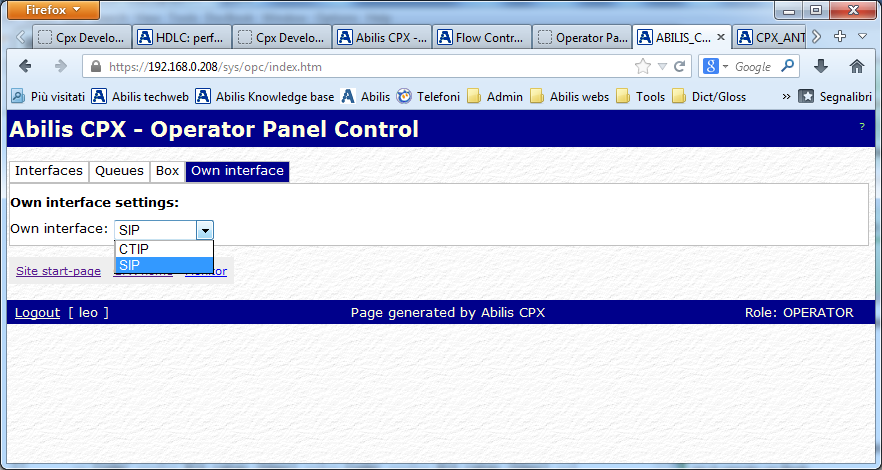
Figure: User leo with two interfaces, SIP selected.
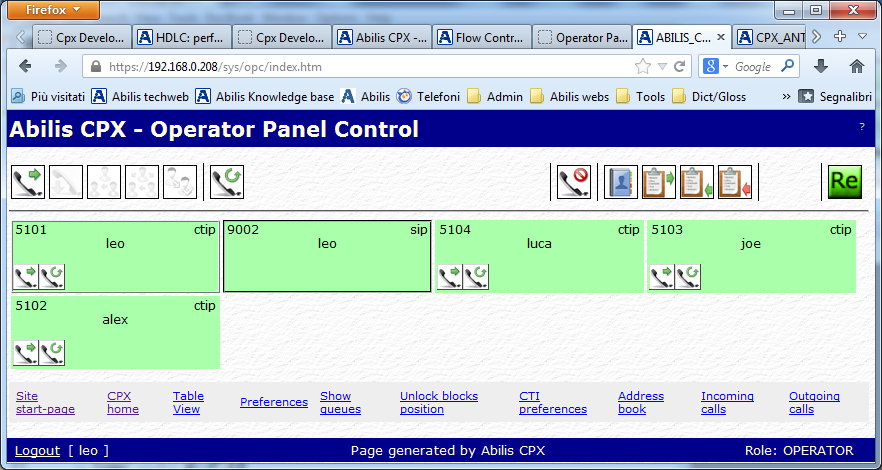
Figure: Two SIP calls, transfer and conference enabled
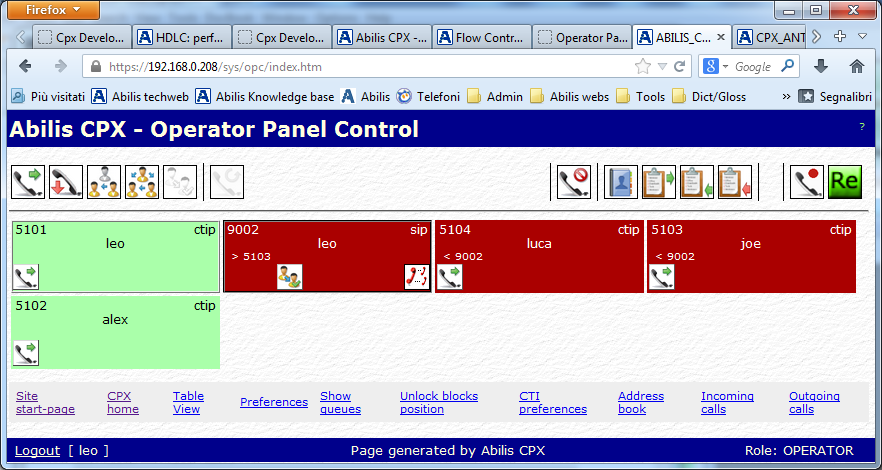
-
Click&Call service requires that the SIP user makes one outgoing call prior to use the service. Abilis will then permanently store in C:\APP\SIP\CAPABILITIES.DAT the codecs supported by every SIP user and will use this information for the ringback call.
If capabilities are unknown a message will be displayed:
Figure: Unknown SIP user capabilities
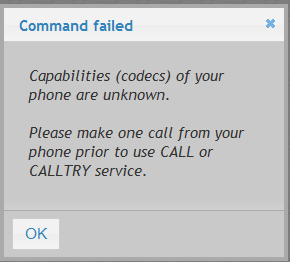
-
Call logs queried from OPC interface now shows and clears records filtered according to the own interface.
-
- Sip
-
-
Added support for the OPC dashboard functionalities. See OPC section above.
-
Added support for supplementary service *9.
If SIP user is SIP-TYPE:PHONE , has SS:YES, and makes a call that fails (BUSY or other reasons), he now hears a BUSY or DISC tone and he can enter *9 to make the call reservation. Abilis will try to call the destination at specified intervals, and if the remote rings it will ringback the SIP user.
-
Extended SIP-UA-PERMIT parameter range and verification API to accept also RU/MR list.
-
- PcPhone
-
-
Added mouseover box indicating counterpart and call duration for staff list entries engaged in conversations.
-
Bug fixes
- Ctisys
-
-
Fixed a bug in the computation of REST-SWAC: and MAX-SWAC: for BRI4, BRI8, BSxxx cards.
The SWAC service was running correctly, but these two diagnostics shown wrong values.
-
